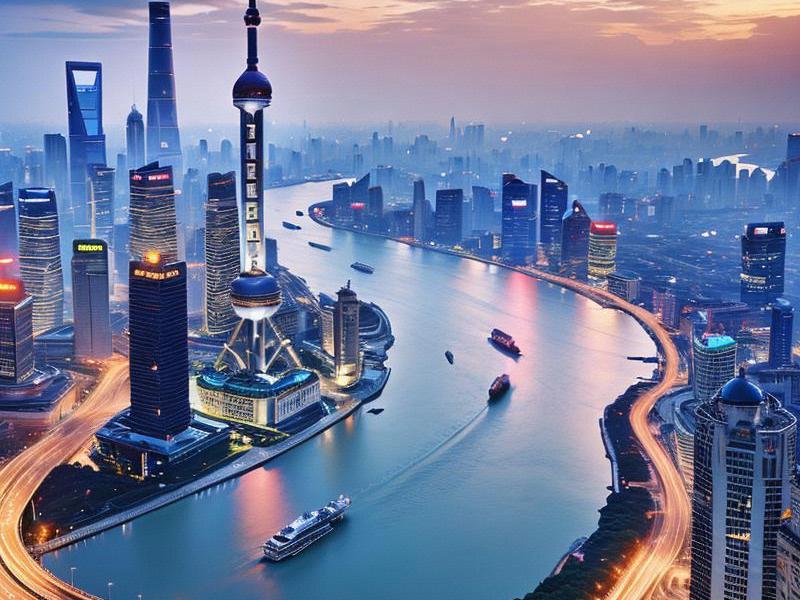This article delves into the multifaceted aspects of Shanghai, exploring its rapid urban development, economic achievements, cultural vibrancy, and its role as a global city. Shanghai, a coastal city in eastern China, has transformed into one of the most dynamic and influential metropolises in the world.

Shanghai, often referred to as the "Pearl of the Orient," is a city that seamlessly blends tradition with modernity. Situated at the mouth of the Yangtze River, it serves as a vital gateway between China and the world. Over the past few decades, Shanghai has undergone a remarkable transformation, emerging as a global financial hub and a cultural powerhouse.
The city's urban development is nothing short of spectacular. The skyline of Shanghai is dominated by iconic skyscrapers such as the Shanghai Tower, the Jin Mao Tower, and the Oriental Pearl Tower. These architectural marvels not only symbolize the city's economic prowess but also reflect its commitment to innovation and modernization. The Bund, a historic waterfront area, showcases a stunning contrast between colonial-era buildings and the futuristic skyline across the Huangpu River.
Economic growth has been the cornerstone of Shanghai's success. As one of China's four municipalities directly under the central government, Shanghai enjoys a unique position in the national economy. It is home to the Shanghai Stock Exchange, one of the largest stock exchanges in the world, and hosts numerous multinational corporations and financial institutions. The city's free trade zone has further solidified its status as a global business hub, attracting investment from around the globe.
Shanghai's economic achievements are not limited to finance. The city is also a leader in industries such as technology, manufacturing, and logistics. Zhangjiang Hi-Tech Park, often referred to as "China's Silicon Valley," is a major center for research and development in the tech sector. The city's advanced infrastructure, including its extensive metro system and efficient port facilities, supports its role as a global trade and logistics center.
上海龙凤419会所 Cultural diversity is another defining feature of Shanghai. The city has a rich history that dates back thousands of years, and it has been influenced by various cultures, including Chinese, European, and American. This cultural fusion is evident in the city's architecture, cuisine, and arts scene. The French Concession, with its charming cobblestone streets and French-style villas, is a testament to Shanghai's colonial past. Meanwhile, the Yu Garden, a classical Chinese garden, offers a glimpse into the city's traditional heritage.
Shanghai's culinary scene is a delightful blend of flavors and techniques. From the famous xiaolongbao (soup dumplings) to the savory shengjianbao (pan-fried dumplings), the city's food culture reflects its diverse influences. The bustling night markets and elegant restaurants cater to a wide range of tastes, making dining in Shanghai an unforgettable experience.
The arts scene in Shanghai is equally vibrant. The city hosts numerous cultural festivals, art exhibitions, and music concerts throughout the year. The Shanghai International Film Festival, one of the oldest and most prestigious film festivals in Asia, attracts filmmakers and audiences from around the world. The city's museums, such as the Shanghai Museum and the Power Station of Art, showcase a rich collection of art and artifacts, ranging from ancient Chinese ceramics to contemporary works.
Shanghai's role as a global city is further enhanced by its commitment to sustainability and green development. The city has implemented various initiatives to reduce pollution, promote renewable energy, and improve public transportation. The Maglev train, which connects the city center to Pudong International Airport, is a testament to Shanghai's investment in cutting-edge technology and sustainable transportation.
上海贵族宝贝sh1314
Education is another area where Shanghai excels. The city is home to some of the top universities in China, including Fudan University and Tongji University. These institutions attract students and researchers from around the world, contributing to Shanghai's reputation as a center of learning and innovation.
Despite its rapid development, Shanghai remains committed to preserving its cultural heritage and improving the quality of life for its residents. The city has invested heavily in urban planning and infrastructure, ensuring that its growth is sustainable and inclusive. Public spaces, such as People's Square and Century Park, provide residents with opportunities to relax and enjoy nature amidst the urban hustle.
Shanghai's international influence is evident in its role as a host city for major global events. The city successfully hosted the World Expo in 2010, attracting millions of visitors from around the world. The Expo showcased Shanghai's ability to organize large-scale events and highlighted the city's commitment to innovation and sustainability.
上海龙凤419 In recent years, Shanghai has also been at the forefront of China's efforts to promote free trade and economic cooperation. The China (Shanghai) Pilot Free Trade Zone, established in 2013, has served as a model for other free trade zones in China. The zone has implemented various reforms to streamline trade processes, reduce bureaucracy, and attract foreign investment.
The city's leadership in innovation is reflected in its focus on science and technology. Shanghai has established several innovation clusters, such as the Zhangjiang National自主创新区 (Zhangjiang National Independent Innovation Demonstration Zone - ZNIDZ), which aims to foster research and development in cutting-edge technologies. The city's government has also introduced policies to support startups and entrepreneurs, creating a fertile environment for innovation.
Shanghai's future looks promising as the city continues to evolve and adapt to the challenges of the 21st century. Its commitment to sustainability, innovation, and cultural preservation ensures that it will remain a global leader in the years to come. As Shanghai continues to grow and thrive, it serves as a model for other cities around the world, demonstrating how urban development, economic growth, and cultural diversity can coexist harmoniously.
In conclusion, Shanghai is a city that embodies the spirit of modern China. Its rapid urban development, economic achievements, cultural vibrancy, and global influence make it a truly unique metropolis. As Shanghai continues to rise, it not only shapes the future of China but also contributes to the global landscape, making it a city worth watching in the 21st century and beyond.